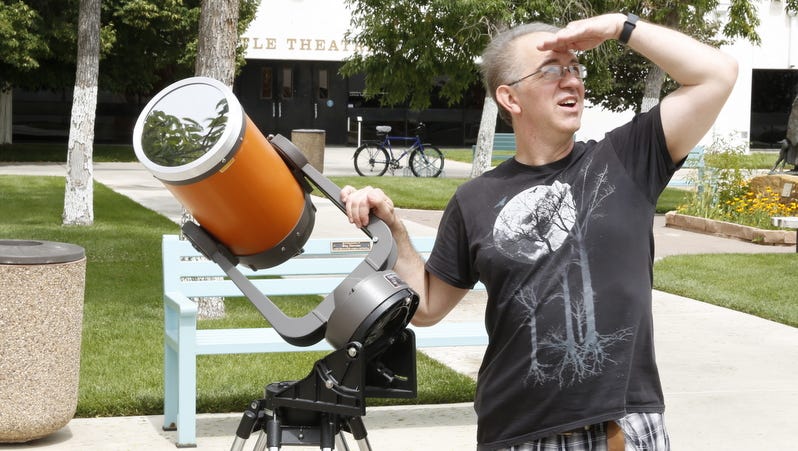2024 solar eclipse watch party: Find the best view at San Juan College Planetarium
Farmington not in path of totality, but sky will dim noticeably

- An eclipse-viewing event at San Juan College begins at 11 a.m. Monday, April 8 in the courtyard outside the Planetarium.
- There will be telescopes and other visual aids available for visitors to use.
- A Zoom presentation of the event also will be offered for those who can't make it in person.
If you’ve lived in Farmington for a significant amount of time and consider yourself a stargazing enthusiast, you may have become spoiled by some of the celestial events you’ve gotten to witness in recent years.
That’s because twice in the last 12 years — in 2012 and in 2023 — the city has been in the path of totality for annular solar eclipses, a stroke of luck that astonishes David Mayeux, the Planetarium director at San Juan College.
“I can’t tell you how rare that it,” Mayeux said last week as he was making plans to present an eclipse-watching event on Monday, April 8. “An annular eclipse is even rarer than a total eclipse. That is, to me, mind boggling.”
This event won’t be quite so monumental for Farmington — at its peak, only 72% of the sun will be obscured by the moon, as the path of totality runs well southeast of New Mexico, through the heart of Texas — but Mayeux is still promising a sight worth seeing on Monday, weather permitting. He’ll have telescopes set up in the courtyard outside the Planetarium on the San Juan College campus at 4601 College Blvd. between 11 a.m. and 1 p.m. that day, and he invites anyone who is interested in the eclipse to come have a close-up look at it.
Get the best view:Will weather affect how much of the eclipse will be seen in Farmington? Here's the forecast
Mayeux said the eclipse will begin at 11:18 a.m. that day and continue through 1:46 p.m. He said it likely will reach its peak at 12:30 p.m.
“We’ll still get a deep partial eclipse,” he said. “It’s great to share with everybody.”
While the sky will be noticeably more dim at the height of the eclipse, turning a deep blue, Mayeux said it won’t grow dark for a few minutes in San Juan County as it did during the 2011 and 2023 events. During the latter eclipse, Mayeux said, the sky dimmed enough for the planet Venus to become visible in the mid-day sky.
“You will feel the difference in temperature,” Mayeux said of Monday’s eclipse. “It will be cooler. … The ambient light on the landscape and in the air will look like you have dark glasses on.”
Search by ZIP code:What time is the April 8 solar eclipse in Farmington?
Monday’s eclipse should be comparable to the 2017 solar eclipse, when the Farmington area experienced 82% coverage of the sun by the moon at its height.
Mayeux not only will be offering glimpses of the event through his telescope, he’ll have other viewing aids available, as well. A digital eyepiece in one of the telescopes will allow him to transmit an enlarged image of the eclipse onto a screen, while he’ll also have some do-it-yourself cardboard boxes that have a pinhole through which sunlight will pass, projecting an image of the eclipsed sun.
One of the best ways to enjoy the eclipse, Mayeux said is to examine the ground under a tree. As the sunlight passes through the limbs and leaves on the tree, it becomes diffused causing dozens of crescent-shaped sun images to appear on the ground. If you can’t locate a tree bearing leaves yet, Mayeux said holding a colander up to the sun and looking at the ground beneath it creates the same effect.
The eclipse-related events Mayeux has held in the past have prove very popular, with the 2011 event attracting approximately 600 people.
Those unable to attend Mayeux’s event in person can log into his online Zoom meeting at https://sanjuancollege-edu.zoom.us/j/99815409798, where he will be projecting images of the eclipse.
The bookstore at San Juan College also is selling glasses and hand-held cards that make for safe eclipse viewing. As always, Mayeux cautioned viewers against doing anything but glancing momentarily at the sun during the eclipse if they aren’t using protective eyewear or cards. Under no circumstances, he said, should anyone stare at the sun without protection for even a few seconds.
This will mark the fourth solar eclipse since 2011 when New Mexico was in the path of totality or achieved significant darkness, and Mayeux noted it will be the last such event for quite some time. The next total solar eclipse to cross the United States won’t come until the 2040s.
That leads Mayeux to advise San Juan County residents to enjoy this eclipse while they can. The only thing that could spoil this opportunity, he said, is the weather, so he’s keeping his fingers crossed for a cloudless day.
Mike Easterling can be reached at 505-564-4610 ormeasterling@daily-times.com. Support local journalism with a digital subscription: http://bit.ly/2I6TU0e.